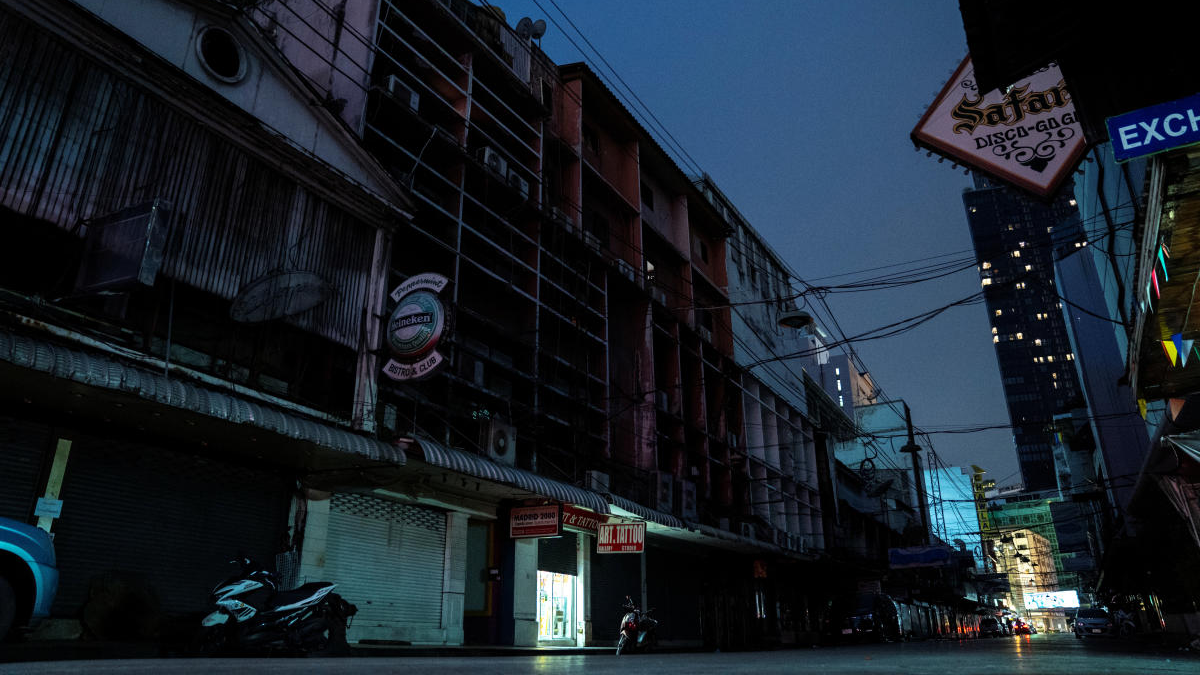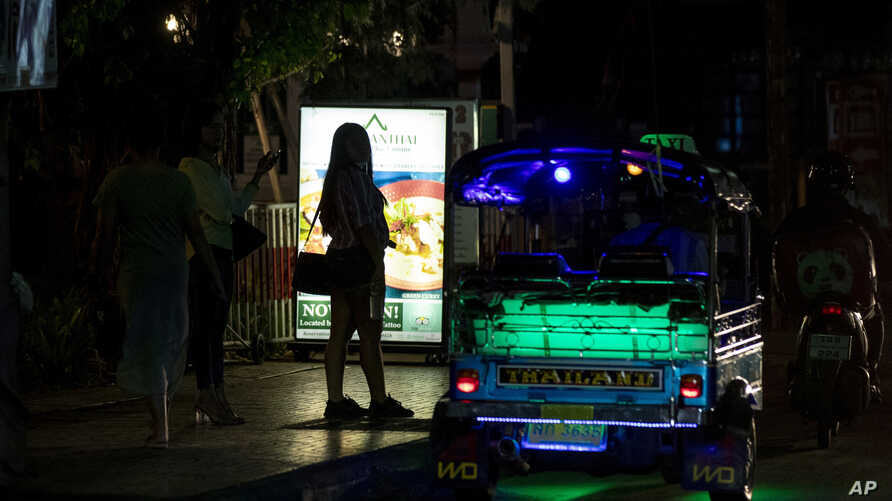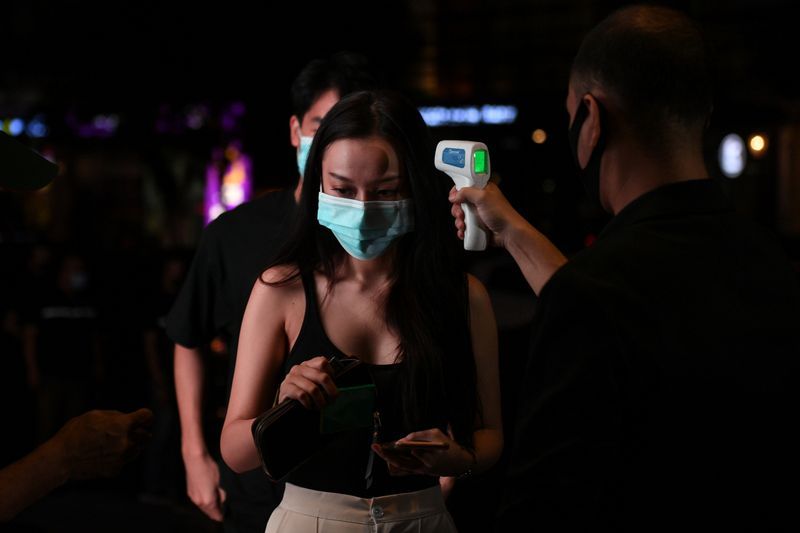
The Patpong district of Bangkok has gone dark during COVID-19 pandemic. /Reuters
The Patpong district of Bangkok has gone dark during COVID-19 pandemic. /Reuters
Editor's note: The coronavirus pandemic has infected 13.5 million people and claimed half a million lives. It's still gaining momentum in many parts of the world. It attacks all – the rich, the middling sort, the pauper – but it's not an equal-opportunity killer. The virus is also changing the conditions of underprivileged people from bad to worse, causing many to join the ranks of the vulnerable worldwide.
In this grim situation, CGTN has launched the series "In the era of pandemic, every life counts." The seventh story focuses on sex workers in Asia's tourist hotspots.
You can read the previous stories on indigenous peoples, ISIL victims, the elderly, gig workers, nursing home residents and actors.
The neon lights have gone out in Thailand's usually bustling nightlife hotspots. Bars, clubs, and massage parlors were among the first to shut down by COVID-19 in March when the Asian country closed its borders to foreigners to keep the virus at bay.
Before the pandemic, Bangkok was one of the most visited cities in the world. Over the years, as the influx of foreign tourists put the Thai capital's nightlife on the map, it also fueled a barely disguised sex industry, unrecognized, but tolerated by local authorities.
When COVID-19 shut down those entertainment venues, hundreds of thousands in the informal sector were out-of-work overnight.
More afraid of hunger than virus
With patrons gone, women, men, and transgender people whose livelihoods depended on foreign tourists soon found themselves in destitution.
"When I work, I get money from tourists. Now, no tourists, I have no money. How can I survive?" said a sex worker named Anna in Pattaya, a world-famous red-light district now empty and quiet. The 33-year-old told Sky News that she earns less in a week than she used to in an hour and finds it difficult to pay for rent and food.
Rights groups estimate that there are at least 300,000 sex workers in Thailand, including tens of thousands of migrants from neighboring Myanmar, Laos, Cambodia, and Vietnam. These migrants have even fewer options than locals when it comes to getting hired elsewhere. Many have been living off charity food handouts over the past months.
According to a 2017 report from Empower Foundation, a group advocating for the rights and opportunities for sex workers in Thailand, over 85 percent are employed in entertainment venues such as karaoke and beer bars, where they worked in relative safety.
But even that little protection was stripped away when the venues were closed down. In order to survive, many sex workers started looking for customers in the street or on the beach.

Sex workers wait by the street side in Bangkok, Thailand, March 26, 2020. /AP
Sex workers wait by the street side in Bangkok, Thailand, March 26, 2020. /AP
"I'm afraid of the virus but I need to find customers so I can pay for my room and food," Pim, a 32-year-old transgender sex worker, told AFP.
Street prostitution is one of the most dangerous professions in the world, already associated with high risks of abuse and sexually transmitted diseases. Now, adding to those hazards is the coronavirus.
"We're more afraid of having nothing to eat than the virus," said Alice, another transgender sex worker, who had to move from a go-go bar to the street side.
Empower Foundation says women in the sex industry are suffering the most from the pandemic's repercussions - a reported 60 percent are single mothers who are their family's main providers, and have been forced into sex work by a lack of opportunities.
A survey conducted by UK-based non-profit Global Network of Sex Work Projects (NSWP) found seven out of 10 sex workers in the Asia-Pacific region reported reduced access to STI testing and treatment during COVID-19.
"We have been abandoned. We have been made invisible, even though we face more hardship than others," said Mai Junta from Empower Foundation in Chiang Mai.
According to the organization, the sex industry in Thailand contributes to four to 10 percent of the GDP, but the workers have no rights. Because prostitution is illegal in Thailand, as in most of Asia, sex workers are excluded from the government's unemployment aid.
The group is currently helping desperate women sell artwork and agriculture produce online to raise money.
Sex tourism in decline
It is not the kind of thing advertised on any tourist brochure. The unsavory impression on the country's tourism is also something the Thai authorities are eager to change.
Local residents say the decline of red-light districts has begun in recent years, as sex tourism becomes a smaller part of Thailand's overall tourism industry.
In 2018, more than 53 percent of visitors to the country were women. As a growing number of Chinese tourists flock to beach resorts in South East Asia, the stereotype of Thailand's tourism sector catering mostly to Western men is also changing. COVID-19 accelerated this shift.

Party-goers return to the reopened bar district in Bangkok as authorities enforce safety rules amid the pandemic. /Reuters
Party-goers return to the reopened bar district in Bangkok as authorities enforce safety rules amid the pandemic. /Reuters
"There are bars all over Bangkok that have been open for 10 to 15 years and now they are closed and they are not coming back," a club manager in Bangkok's red-light district Patpong told Reuters.
With no locally transmitted coronavirus case reported in Thailand for more than six weeks, many businesses have been allowed to reopen, but borders remain closed. Nightlife venues were among the last to reopen in July with social distancing rules.
Health ministry spokesman Rungruang Kitpati said in the new normal, Patpong will have to adapt a lot. "It may end up looking different, but this change will be for the better," he said.